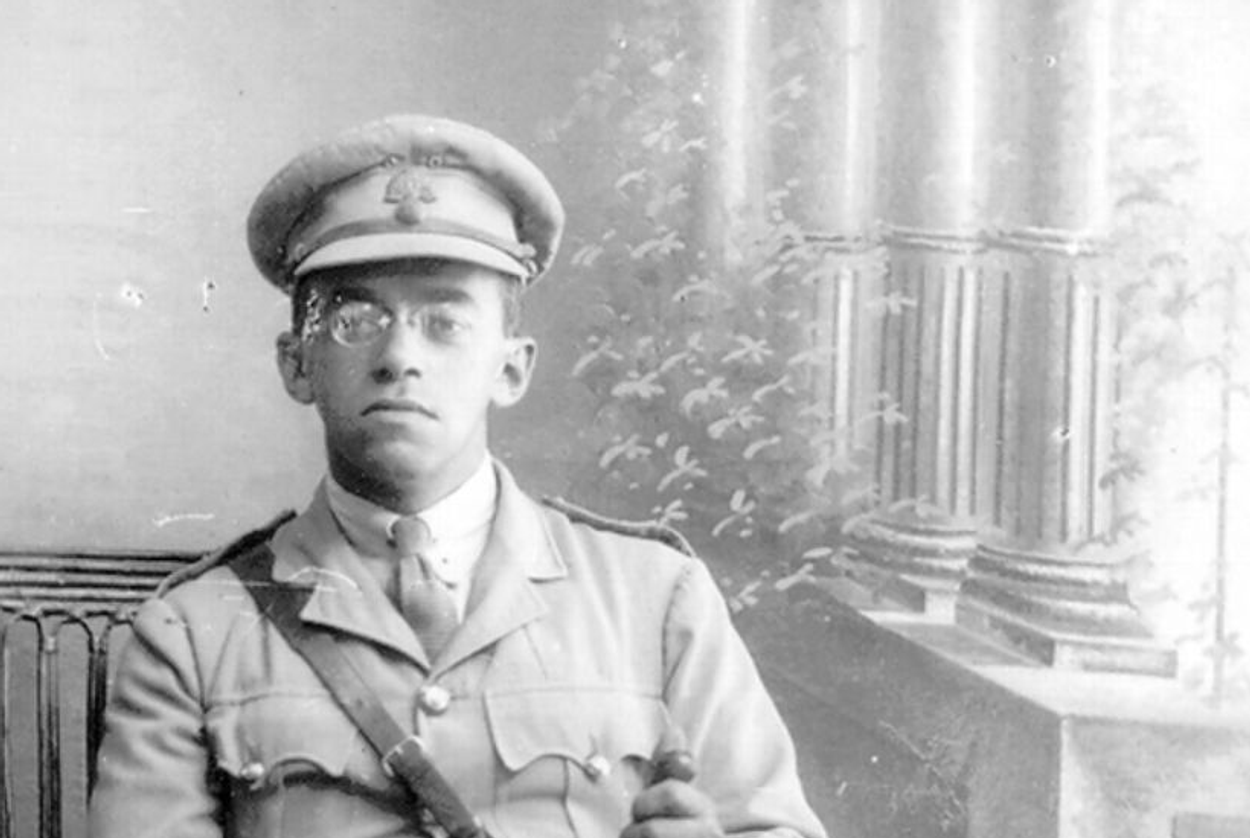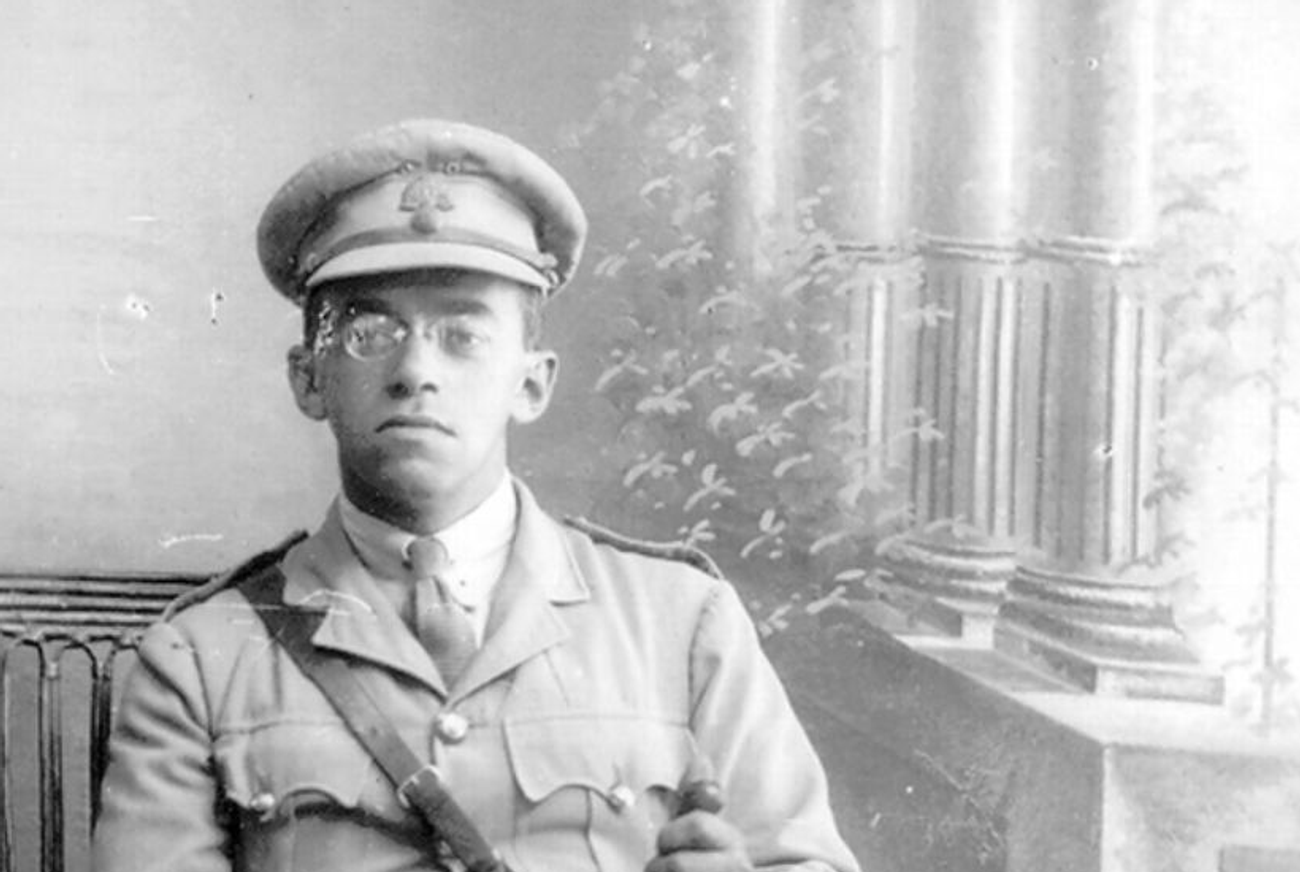‘Jabotinsky: A Life,’ by Hillel Halkin
An excerpt from a new biography of Vladimir Jabotinsky, the founder of right-wing Zionism




This is a sponsored post on behalf of Yale University Press and their Jewish Lives series.
If I could raise any of the great figures of Zionist history from the dead for an hour’s conversation, I would choose Jabotinsky. Herzl would awe me into silence. Weizmann would not think me worth his time. Ben-Gurion would harangue me. Jabotinsky would chat affably over a beer in La Coupole, his favorite brasserie on Boulevard Montparnasse, delighted to see it was still there.
In the 1930s, La Coupole was a gathering place for Picasso, Sartre, Malraux, Jacques Prevert, Chagall, Edith Piaf, Josephine Baker, and others, but there is no indication that Jabotinsky knew any of them or that they had the slightest notion who he was. At most he would have been the short, boyish-looking middle-aged man with the glasses, double-breasted suit, firm chin, and gray cowlick of hair at the next table, laughing and joking with his friends and colleagues in Russian or foreign-accented French. Serious conversations took place at that table, too, of course; the one rule laid down by him was never to talk politics after work. Books and literature—by all means; theater, films, science, philosophy, friends, women, travels, food, goings-on about Paris, reminiscences, memories of Russia and Odessa—all welcome topics. Zionism, though, was hors-jeu. There had been enough of it during the day.
He had given his life to it but needed to keep a space free of it. Ultimately, Vera Weizmann may have been right that politics were not his true vocation. Herzl died young and thwarted, but he had created political Zionism. Weizmann ended as an irrelevance, the figurehead first president of a Jewish state he had never wanted to fight for; yet he was instrumental in keeping Zionism alive in the years after Herzl’s death and in obtaining the Balfour Declaration, without which it could have gone no further. Ben-Gurion, more than anyone, could claim credit for the establishment of Israel, at whose helm he imposingly stood in its first years; his rupture in old age with a Mapai leadership he had fallen out with was a melancholy postscript to a triumphant career. Jabotinsky, apart from his partial success with the Jewish legion, which did not substantially change Zionism’s course, was a political failure, the perennial leader of the Zionist opposition.
More prescient about most things than the men he opposed, he never had their power to influence events. He was one of the first to anticipate that England would win World War I and drive the Turks from Palestine, and that Zionism’s future lay with it. He foresaw ahead of others that British governments would betray the Balfour Declaration unless sufficient pressure was exerted on them not to. He understood from the start that socialism could not develop the economy of Palestine fast enough to attract massive Jewish immigration and was not in the long run a viable economic system. He grasped early on that European Jewry was on the verge of a catastrophe from which it could be saved only by a Jewish state. He realized before anyone that the struggle for Palestine would be decided by a Jewish-Arab war. Weizmann and Ben-Gurion eventually came to see these things, too, Ben-Gurion sometimes sooner than Weizmann, but Jabotinsky saw them sooner than either of them.
Was he responsible for his own failure? Could he have gained control of the Zionist movement had he made less stubborn, less prideful, tactically wiser decisions—fought, say, to return to Palestine in 1930, or chosen to stay in the Zionist Organization in 1934? History has no answers to what-if questions; neither can it tell us whether, had Jabotinsky been in Weizmann and Ben-Gurion’s place in the years before World War II, he could have done anything they didn’t. Were the grandiose plans that he hatched—petitions with millions of signatures, diplomatic pacts with European governments, a Jewish army landing on the shores of Palestine or fighting the Wehrmacht—ever more than the wild fantasies they were derided as by the Zionist Left? Was he, who so trenchantly criticized the Left’s delusions, the victim of ones at least as great?
He was a man of contradictions. He had enormous literary talent and wrote a vast amount, most of it journalism and political polemic in which this talent was but dimly reflected. He dedicated himself to a people and a land that he never found particularly attractive. A firm believer in “individualism,” he developed a philosophy of revolutionary Zionism that called for the utter subordination of the individual to the group. He abhorred fascism, yet founded a political party and a youth movement that were repeatedly accused of it. In his personal relations with others, he scrupulously treated them as equals; as a political leader, he allowed a personality cult to form around him. The author of a novel that condemned the loss of the concept of “the forbidden,” he sanctioned the spilling of innocent blood.
If there was a common denominator in all this, it was of someone who became what he did by acting against his deeper instincts—or rather, whose deepest instinct was to overrule all his other instincts in the name of a single, willed goal. This self-denial had a brio that made it seem like self-assertion. It was self-assertion. Perhaps here lies the resolution of the paradox of freedom and duty that had already occupied him as a young man in Odessa.
But the contradiction I want to talk to him about is another one. “I need to ask you something,” I say.
“Please.”
“You were always a territorial maximalist and a political democrat. One can’t say that of Ben-Gurion, Weizmann, or Herzl. Weizmann and Ben-Gurion supported partition—once in your lifetime and again in 1947. Weizmann was a social and cultural elitist. Ben-Gurion was a Leninist in his younger years. Herzl would have settled for Uganda. He thought a Jewish state should be an ‘aristocratic republic,’ because the masses couldn’t be entrusted with political decisions. You alone cared passionately about the right to all of Palestine and the rights of all who lived there. You wouldn’t concede any of it and you said that the moment Jews formed fifty-one percent of its population, you would grant full equality to every Arab.”
“I meant it.”
“But how could a Jewish fifty-one percent have ruled an Arab forty-nine percent without being an ethnic dictatorship?”
“It couldn’t have. But it wouldn’t have remained fifty-one percent for a day. Millions of Jews wanted only to leave Europe. As soon as there was a Jewish state to take them in, they would have arrived by the boatful. Fifty-one percent would have become sixty percent, seventy percent, eighty percent, in no time. That’s the same ratio of Jews to Arabs that you have in Israel today, excepting the Palestinians in Judea and Samaria.”
“I see you’ve managed to keep abreast of things.”
“Only in Israel. I don’t follow much else. You’d be surprised how much that matters when you’re living no longer does when you’re dead.”
“I don’t have to tell you, then, that since 1967 we’re a country torn in two: the party of territory and the party of democracy, the land of Israel versus the rights of man, the Right against the Left. I need to know where you stand.”
“I’m a man of the Right.”
“Of course. And that’s how you’re remembered today: the fiery nationalist, the unyielding Jewish patriot, the man of ‘Both sides of the Jordan are ours’—unless you’re simply the name of a street in every city and middle-sized town in Israel. But you were more complicated than that. So is the situation. We control all of Palestine now—and those millions of European Jews don’t exist any more.”
“No, they don’t.” His hands clench and unclench on his knees. “I was lucky not to live to see them die. If only I could have seen Israel born, though!”
“But what should Israel do now?” I ask. “Return to its 1967 borders for a dubious peace? Going on ruling millions of Arabs against their will and the wishes of the world? Not all of us have taken sides. Some of us are split down the middle just like the country. There’s no one whose opinion would matter to us more than yours.”
“Get the best deal you can,” he says.
I look at him.
“I’ve disappointed you? You would have liked me to be more specific? A Palestinian state, the settlements, Jerusalem? I agree, the details are everything. I just don’t have the head for them any more. I had the reputation of a zealot, but I was the least ideological of all Zionists. The best possible deal for the Jewish people was all I wanted. For that, though, we had to be tougher and smarter than we were. There’s no other way to survive in this world: I learned that as a boy in Odessa. Well, you have the state I dreamed of. It came too late for too many Jews, but it’s there. Don’t lose it.”
“But what is the best possible deal?” I persist.
He glances at his watch. “That, my friend,” he says, “you’ll have to figure out for yourselves. If you want my advice, never take advice from a dead man. I really do have to go now. Ania will be worried.”
I reach for the check on the table.
“Permit me,” he says. “We get an allowance for things like this.” He takes a bill from his wallet and regards it with curiosity.
“It’s called a euro,” I say. “Francs haven’t been used for years.”
He smiles. “You see what I mean about keeping abreast. Will this be enough?”
“It’s plenty.” He hands it to the waiter. “S’il vous plait, monsieur,” he says.
Excerpted from Jabotinsky: A Life by Hillel Halkin, published by Yale University Press. Copyright 2014 by Hillel Halkin. Reprinted by Permission.
***
Hillel Halkin is a critic, translator, and author of six books, the most recent of which is a novel, Melisande! What Are Dreams?